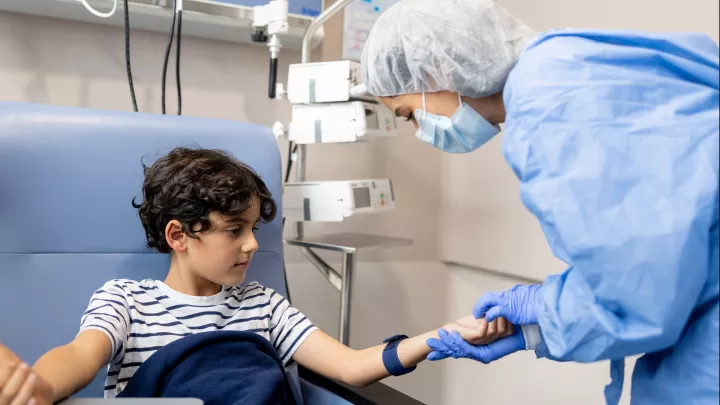
As FDA Expands Approval of a New Gene Therapy to Treat Duchenne Muscular Dystrophy, a CHLA Expert Weighs in
After previously approving its use for a limited population, the U.S. Food and Drug Administration has now approved Elevidys, a gene therapy designed to treat Duchenne muscular dystrophy (DMD), for a broader range of child patients.
Leigh Maria Ramos-Platt, MD, Medical Director of the Neuromuscular Disorders Center at Children’s Hospital Los Angeles, has previously treated 6 patients with DMD at CHLA using Elevidys and has seen excellent results. She is thrilled at the announcement of the FDA’s expanded approval. “This is great news; a breakthrough for the practice of neuromuscular medicine,” Dr. Ramos-Platt says.
The Neurological Institute at CHLA operates one of California’s largest pediatric DMD programs. Dr. Ramos-Platt explains that the FDA’s newly expanded approval is expected to allow CHLA to treat many more patients with Elevidys—patients who were not eligible before. Having seen the benefits of Elevidys, Dr. Ramos-Platt is eager to be able to bring the gene therapy to more children with DMD. “The consensus is that it's better than any alternative out there currently, even though there are likely to be better treatments in the future,” she explains.
A genetic disorder leads to progressive degeneration
DMD is a genetic condition in which a defective gene causes either abnormalities in, or the absence of a protein called dystrophin, which helps muscle cells to remain intact. This leads to muscle degeneration, which worsens over time.
DMD symptoms usually begin between the ages of 3 and 6, and can include difficulty walking and running, frequent falling, excessive fatigue and learning disabilities. Weakening heart and respiratory muscles can also lead to heart issues and breathing problems which can be life-threatening. DMD mainly affects males but can affect females in rare cases.
Accelerated approval for a unique gene therapy
Elevidys is a recombinant gene therapy that is administered to patients as a single intravenous dose. It treats DMD by delivering a gene into the body that produces Elevidys micro-dystrophin, a shortened protein which includes certain elements of the regular dystrophin protein. While not identical to normal dystrophin, Elevidys micro-dystrophin helps to prevent DMD-related muscle degeneration.
“We know that even small amounts of dystrophin make a difference,” says Dr. Ramos-Platt.
The FDA first granted accelerated approval for Elevidys in June 2023 for ambulatory individuals who are 4 through 5 years old and have a confirmed mutation in the DMD gene. Accelerated approval enables the FDA to quickly authorize certain treatments for serious diseases that have an unmet medical need and for which available therapy is not deemed adequate. Additional clinical trials are then required to confirm the treatment’s effectiveness.
The FDA has now broadened its approval of Elevidys. The gene therapy received traditional approval for ambulatory individuals who are 4 years of age or older and have a confirmed DMD gene mutation, and accelerated approval for non-ambulatory individuals who are at least 4 years old and have a mutation in their DMD gene.
This approval was granted to Elevidys manufacturer Sarepta Therapeutics Inc. based on clinical data from one study conducted among 4- to 7-year-olds and another study with 4- to 5-year-olds. The initial safety of Elevidys was determined through four clinical studies involving 156 male patients with DMD. The side effects that were observed in some cases were nausea, vomiting, fever, acute liver injury, a low blood platelet count and in some cases muscle inflammation. For patients treated with Elevidys, it is thus important to monitor liver function and heart muscles during treatment.
A breakthrough for many families

As soon as the FDA’s approval expansion for Elevidys was announced, Dr. Ramos-Platt began contacting patient families to address their questions.
“I am overwhelmed with joy,” she says. “In fact, I am calling families of our patients right now. I am thrilled that the positive changes I have seen in six patients we have treated with this gene therapy may now be potentially available for our kids with Duchenne over the age of 4.”
Dr. Ramos-Platt makes clear that Elevidys is not a cure for muscular dystrophy. “I've generally told my patients that even with this gene transfer therapy, they still have muscular dystrophy. Also, we do not yet know how long the effect of this treatment will sustain.”
But Elevidys micro-dystrophin may significantly slow disease progression, making a major difference for patients. Dr. Ramos-Platt says that the original 4 patients who were first dosed with Elevidys 7 years ago in Ohio are still doing well. “They're theoretically going to produce a better protein than what they were producing before, and more of it. And I think no matter what, there's a chance that there will be a benefit—whether that looks like achieving motor milestones, slowing down their decline, or just stabilizing the patient. Some people will probably see a more dramatic response compared to others.”
Dr. Ramos-Platt explains that a small number of patients have a specific mutation that makes them ineligible for this gene therapy, or are antibody positive against the treatment vector. “And there are other factors that have to be considered when taking on a therapy like this. This includes how strong their hearts are, the health of their livers, and the patients’ and families’ ability to adhere to the frequent follow-up appointment schedule that is necessary to assure safety.” But a significant number of individuals may be able to benefit from the treatment. “We have many patients whose lives may be changed, and I am so happy for them.”
The FDA’s expanded approval of Elevidys was announced on June 20, 2024.


